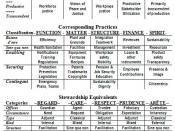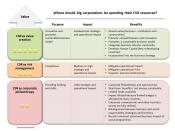One of the most controversial issues that has been widely debated over the last two decades is the corporate social responsibility of organizations. Opinions about business's social responsibilities lie mainly between two extremes. At the one extreme is the classical view that states business is an economic institution directed towards profit whose only responsibility to society is to provide goods and services and to return maximum benefits to shareholders (Robbins, Bergman, Stagg and Coulter, 2003: 136). The Nobel Prize winning economist Milton Friedman endorsed this classical view. Friedman said the primary responsibility of manager's is to operate the business to satisfy the interest of shareholders, and this interest of course is profit maximization (Robbins et al., 2003: 136). At the other extreme, there is the socioeconomic view that states business is a part of the larger society and, therefore, it has responsibilities other than simply maximizing profits (Robbins et al.,
2003: 137). Some proponents of this view also contend that it is often in a company's financial self-interest to be socially responsible.
The topic of corporate social responsibility has been widely argued and debated about because it is becoming an increasingly important concern to the society in which an organization operates in. Over time the classical economic theory based business social responsibility evolved to see business social responsibility as more than just profit. Businesses worldwide have become more socially responsible, but they still are pursuing economic interests. Economic interests will always remain the number one priority for businesses all over the world. "Any mechanism for enforcing or urging social responsibility upon firms must of course reckon with a profit motive..." (Arrow, 1973: 304). This essay is going to look at the views of corporate social responsibility and then critically analyze the issues related to it, and then drawing up to...


